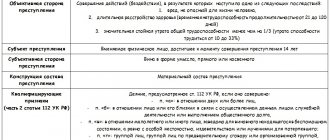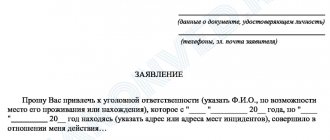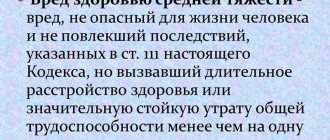Law of the Russian Federation on harm to health of moderate severity
- For intentional infliction of moderate harm to health, liability will follow under Article 112 of the Criminal Code of the Russian Federation.
- For causing harm of moderate severity in an affective state, liability will follow under Article 113 of the Criminal Code of the Russian Federation.
- For causing moderate harm by exceeding measures during detention, liability will follow under Article 114 of the Criminal Code of the Russian Federation.
If you don’t yet know how exactly average harm to health is determined, read:
- Criteria for average health harm.
- Signs of moderate harm to health.
Concept and corpus delicti
In the Criminal Code of the Russian Federation, harm to health means a violation of the integrity of tissues or any organs, a violation of the functional state of the upper and lower extremities or other organs, and diseases or other pathologies if they are caused by bodily injuries. Severity is determined by the following criteria:
- how dangerous the damage is to the life of the victim;
- how long the victim’s health disorder lasted;
- whether the disability is stable;
- whether a limb or organ or its functionality was lost;
- whether there was loss of hearing, speech or vision;
- during the infliction of bodily harm, whether a mental health disorder was caused;
- whether the victim has permanent facial disfigurement.
Forensic medical examination determines severe, mild or moderate harm to health has been caused to a person.
The corpus delicti under Art. 112 of the Criminal Code of the Russian Federation:
- objective side: a socially dangerous act, which is expressed in the form of action or inaction, the consequences of which are the average severity of harm to health;
- subjective side: guilt expressed in direct or indirect intent (the accused must be aware of the danger of his actions, or foresee the possibility or inevitability of moderate harm as a result of his actions);
- subject: sane citizen over 14 years of age;
- object: social relations.
Qualification of intentional infliction of moderate harm to health:
- committing a crime against two or more citizens;
- in relation to a person or his close relatives in connection with the performance of public duty or official activities;
- in relation to a minor, or if the person was in a helpless state;
- the act was carried out with particular cruelty;
- the crime was committed by a group of persons, an organized group, or a group by prior conspiracy;
- for hooligan reasons;
- The motive for the crime is political, ideological, racial, religious or national hatred or enmity (including enmity towards any social group).
Signs of moderate health harm
There are a number of criteria for average harm to health. They are used to determine the severity of injuries inflicted. Thus, signs of moderate health harm are:
- there was no direct danger to the victim’s life;
- the victim lost his ability to work for more than 21 days;
- the citizen has lost his ability to work by 10-30%;
- The victim does not have serious conditions.
For example, moderate injuries include fractures and cracks of ribs or other small bones, injuries that resulted in only soft tissue being affected, and so on.
What is the punishment?
Criminal liability
Article 112 of the Criminal Code of the Russian Federation - intentional infliction of moderate harm
Responsibility for this offense begins at the age of 14 . The punishment will depend on the presence of qualifying features.
Reference: qualifying features are a number of reasons why a criminal may aggravate his sentence.
Without them, the following liability is possible:
- imprisonment for up to three years;
- restriction of freedom for up to three years;
- forced labor for up to three years;
- arrest for up to six months.
If such qualifying characteristics are present, the penalty is up to five years. Below, in the paragraph about qualifying features, we will talk about them in detail.
We talked more about intentionally causing damage in this article.
In a state of passion
Persons over 16 years of age must be held accountable for this offense . For such a crime the following liability is provided:
- restriction of freedom for up to two years;
- forced labor for up to two years;
- imprisonment for up to two years;
- correctional labor for up to two years.
By exceeding measures during detention
A person who has committed a crime under Article 114 of the Criminal Code of the Russian Federation may receive the following sentence:
- restriction of freedom for up to two years;
- correctional labor for up to two years;
- forced labor for up to two years;
- imprisonment for up to two years.
Current material on the topic: Causing harm during the detention of a person who has committed a crime.
Fines
Causing moderate harm to health is not punishable by penalties as the main punishment , but this is possible as an additional measure. Specific amounts are not provided; their size will vary depending on the specific situation.
Important: an exception to the rule is average harm to health resulting from an accident. In accordance with Article 12.24 of the Code of Administrative Offenses of the Russian Federation, penalties range from 10 to 25 thousand rubles, or deprivation of rights for up to two years.
Other types
This includes damage caused by negligence. Since there is no such article in the Criminal Code of the Russian Federation (there is only one for serious bodily injury), the perpetrator faces payment of financial and moral damage.
To make everything clearer, here are a few examples:
- example 1. Citizen P.N. Kovaleva was walking down the street in the evening and suddenly she was accosted by several hooligans who began to pester her.
She began to resist, and the criminals began to beat her. The medical facility revealed that she had a broken arm, a concussion and bruises all over her body. Pay attention to the qualifying features (a detailed list is given below): a criminal group, an atrocity committed due to ordinary hooliganism, the victim was a minor. Based on this, we can conclude that the perpetrators face up to five years in prison. - Example 2. Citizen Mironov D.I attacked his friend in an affective state.
The injuries he inflicted (concussion, dislocated leg, scratches) were classified as moderate harm to health. Since there are no aggravating features when inflicting injuries in an affective state, the perpetrator can receive a maximum sentence of up to two years. This may be deprivation or restriction of freedom, as well as correctional or forced labor. - Example 3. Policeman S.L. Pronin
detained a criminal and exceeded his authority. He struck him several times in the torso area. A medical examination determined a rib fracture, i.e. a moderate injury. There is one small nuance here: during the arrest, the measures he took (use of physical force) were not forced. This leads to the fact that S.L. Pronin faces a more serious punishment, restriction or imprisonment for up to two years, forced labor or correctional labor for up to two years.
Qualifying features
Consider intentional infliction of damage. Here the period will depend on the qualifying features:
- a crime as a result of which more than 2 people were injured;
- assault while performing official duties;
- if the victim was a minor and could not defend herself;
- a crime that was committed by force or humiliation;
- a criminal group consisting of several people;
- crime committed due to ordinary hooliganism;
- the villain who used the weapon;
- discrimination against religion or race.
Responsibility changes significantly.
Without such aggravating features, the maximum term is three years. And then, in the worst case, prison is a last resort. And with them, prison sentences can be up to five years. Causing harm to health by exceeding measures during detention depends on whether there was intent to cause the damage . If the victim was injured for the purpose of defense, then deprivation of liberty, restriction of liberty, or the award of compulsory or forced labor can only be carried out for a period of up to one year.
But if the damage was received not for the purpose of defense, but intentionally, then the punishment will be twice as large; accordingly, the court can limit freedom, deprive of freedom, or award compulsory or correctional labor for up to two years.
For your information: causing moderate harm to health in an affective state under Article 113 of the Criminal Code of the Russian Federation does not have specific signs on which liability will depend. Based on this, it is impossible to say how it will change; the decision is made individually in each case.
What does "unintentional" mean?
Causing minor harm to health through negligence (unintentional) is an act that has signs of minor harm to health , namely the absence of a threat to life, minimal damage to health, short-term treatment for 21 days, loss of ability to work up to 10% and not having any intent (not direct , nor indirect).
How to prove that this was done through negligence?
To do this you need to collect some evidence:
- recordings from CCTV cameras, recorders, etc.
Important! It is especially important in case of an accident; a video recorder is often the only thing that can confirm your innocence. - Witnesses who can testify that the act was committed without intent.
- Other evidence based on the specific situation.
Having collected them, you need to submit them to the investigation and wait for the result. If the evidence is significant and it clearly shows that it was a simple “coincidence” of circumstances, then the court will recognize your innocence and all that threatens you is payment of damages (financial and moral).
Since unintentional harm to health is equivalent to injuries sustained through negligence (these are synonyms), the procedure for refuting one’s guilt is absolutely the same.
Why do this?
Some people think that this is not necessary at all.
In most cases, the police do not want to open cases of minor bodily harm, and the victim cannot always prove that it was intentional bodily harm. But this needs to be proven, and here's why. At a minimum, the victim can sue for compensation for treatment costs and moral damages, and a verdict can be rendered in his favor. Then you can lose a considerable amount of money.
How to hold people accountable?
As we described above, criminal liability threatens in all cases (intentional infliction of injury, infliction of moderate harm in a state of passion, injury by exceeding measures during detention), except for injuries of moderate severity received due to negligence.
- Visit the police station to file a criminal complaint. It should contain:
- Full name, residential address, contact number, signature, date.
- Information about the crime committed: time and place where it happened, the number of criminals, their actions, etc.
- The purpose of the statement is to bring the perpetrator to criminal liability.
- After submitting the application, an inspection will begin, a forensic medical examination will be carried out to determine the presence of harm to health and the severity.
As a result, when the case materials are processed, the investigator will issue a verdict to initiate a criminal case : a positive answer or a refusal.






